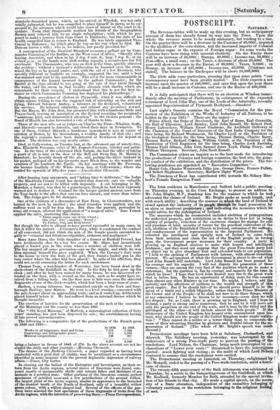The Irish residents in Manchester and Salford held a public
meeting on Thursday evening, in the Corn Exchange, to present an address to Mr. John Bright, M.P., thanking him for the manner in which he had..4 advocated the claims of Ireland. Mr. Bright spoke at much length, and. with much ability ; describing the manner in which the land of Ireland is closed against the industry of its people through its legal possession by an alien or insolvent proprietary ; and indicating the measures which he would advise for the redemption of Ireland. The measures which he enumerated included abolition of primogeniture for undevised property, and restrictions on its devise to lives not in registry of property, reduction of the enormous charges for stamps for and purchase of land, security of tenure for the practical cultivators of the soil, abolition of the Established Church in Ireland extension of the and reinforcement of the representation in the Imperial Parliament. $e• the intelligent and upright men of Ireland to come fo from their isolation and claim the aid of the English people in fore ins upon the Government proper measures for their country. A party II owing up in England anxious to unite with honest and intelligent en ; and they must not suppose that the great Free-trade party had no object but to give abundant food and extended trade to our population. " I look to the opening of Parliament with intense,. with almost trembling interest. We are ignorant of what the Government is about to do—of what Lord John Russell will undertake. Lord John Russell has been praised for his courage and his sagacity. I will not dispute his possession of these virtues,—thev are among the very first of the qualities which go to make a statesman ; but the question is, has he courage and sagacity for the time in which he lives ? I hope that Lord John Russell may rise to the great work that is before him. He has an opportunity of doing more for this country ' than almost any other Minister in our time. He might, I believe add the industry and the affections of millions to the wealth and strength of this. ') great empire. But if he should fail—if he should prove himself to be the • agent of a timid and a selfish Oligarchy, rather than the Prime Minister of the Crown and of the People—if he shall not dare to do these things, which in my conscience I believe he knows to be necessary—even then we will not despair ; for, as I said, there is growing up in England, and I hope in Ireland, a party so strong and so numerous, that by and by it will leave out only the pauperism at one end of the scale, and it may be the titled and the privileged at the other—it will include almost the whole people." If the Aristocracy of the United Kingdom has heaped evils unnumbered upon Ire- land,
why should not the people of the United Kingdom make ample restitu- tion ? "They cannot do a nobler or a better thing than to consecrate the cause of their advancing liberties by glorious and fruitful labour for the re- generation of Ireland." [The whole of Mr. Bright's speech was much cheered.]
Protectionist meetings have been held at Salisbury, Chelmsford, and Alnwick. The Salisbury meeting, yesterday, was interrupted by the endeavours of a strong Free-trade party to prevent the passing of the resolutions. Lord Nelson, the Chairman, being much interrupted by ex- clamations of " Lower your rents ! ' threatened to have the interrupters ejected : much fighting and rioting ; in the midst of which Lord Nelson ventured to assume that the resolutions were carried.
The Protectionist meeting at Limerick, on Thursday, enlightened by Mr. Monsell, ended in the passing of a Free-trade resolution, amid a hurri- cane of cheers.
The twenty-fifth anniversary of the Bath Athenmum was celebrated on Thursday, by a soiree in the banqueting-room of the Guildhall, at which Mr. Roebuck, formerly Member for Bath, attended by the special invite- lion of his friends in that city. He made a capital speech, on the neces- sity of a State education, independent of the casualties belonging t? voluntary exertions, or the restriction belonging to the religious feeling of sect.






























 Previous page
Previous page